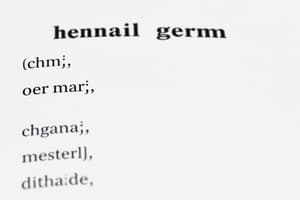Podcast
Questions and Answers
Welche Aussage wäre korrekt, wenn jemand sagt, dass er kein Buch liest?
Welche Aussage wäre korrekt, wenn jemand sagt, dass er kein Buch liest?
- Er hat ein Buch.
- Er liest keine Bücher. (correct)
- Er liest ein Buch.
- Er mag Bücher.
Was wird verwendet, um das Negative im Deutschen auszudrücken?
Was wird verwendet, um das Negative im Deutschen auszudrücken?
- Kein (correct)
- Wenn
- Ja
- Aber
Welches der folgenden Nomen hat die korrekte Pluralform?
Welches der folgenden Nomen hat die korrekte Pluralform?
- die Gitarren (correct)
- die Gitarre
- die Gitar
- die Gitarres
Wie wird 'Das ist nicht meine Tasche' auf Englisch übersetzt?
Wie wird 'Das ist nicht meine Tasche' auf Englisch übersetzt?
In welcher der folgenden Fragen wird höflich nach einer Person gefragt?
In welcher der folgenden Fragen wird höflich nach einer Person gefragt?
Welches Wort wird verwendet, um eine Verneinung mit Verben zu bilden?
Welches Wort wird verwendet, um eine Verneinung mit Verben zu bilden?
Wie sagt man 'Ich arbeite heute nicht' auf Englisch?
Wie sagt man 'Ich arbeite heute nicht' auf Englisch?
Was ist die Pluralform des Wortes 'die Kamera'?
Was ist die Pluralform des Wortes 'die Kamera'?
Was ist ein Hauptmerkmal von Ja/Nein Fragen?
Was ist ein Hauptmerkmal von Ja/Nein Fragen?
Wie lautet ein Beispiel für eine Doch/Nein Frage?
Wie lautet ein Beispiel für eine Doch/Nein Frage?
Welches Wort ist das korrekte negative Wort für 'eine' im Nominativ?
Welches Wort ist das korrekte negative Wort für 'eine' im Nominativ?
Welches Beispiel veranschaulicht den richtigen Gebrauch von kein im Akkusativ?
Welches Beispiel veranschaulicht den richtigen Gebrauch von kein im Akkusativ?
Welches der folgenden Wörter ist im Plural richtig geschrieben?
Welches der folgenden Wörter ist im Plural richtig geschrieben?
Was ist eine richtige positive Antwort auf die Frage: 'Hast du keine Bluse?'
Was ist eine richtige positive Antwort auf die Frage: 'Hast du keine Bluse?'
Wie wird der Plural von 'kein' verändert?
Wie wird der Plural von 'kein' verändert?
Was ist der korrekte Nominativ für das Wort 'die Jacke'?
Was ist der korrekte Nominativ für das Wort 'die Jacke'?
Wie viel kosten die Stiefel in Euro?
Wie viel kosten die Stiefel in Euro?
Welches Wort beschreibt die Bedeutung von 'etwas' im negativen Sinne?
Welches Wort beschreibt die Bedeutung von 'etwas' im negativen Sinne?
In welchem Fall wird 'kein' im Singular für feminine Nomen verwendet?
In welchem Fall wird 'kein' im Singular für feminine Nomen verwendet?
Wie lautet der Plural von 'das Buch'?
Wie lautet der Plural von 'das Buch'?
Welche der folgenden Aussagen ist korrekt?
Welche der folgenden Aussagen ist korrekt?
Wie viel kostet die Hose?
Wie viel kostet die Hose?
Welches Wort ist dein korrektes Ergänzung für 'Ich habe einen Block, aber Maria hat drei _______________'?
Welches Wort ist dein korrektes Ergänzung für 'Ich habe einen Block, aber Maria hat drei _______________'?
Wie lautet die korrekte Frage nach dem Preis von 'dem Tuch'?
Wie lautet die korrekte Frage nach dem Preis von 'dem Tuch'?
Was ist die korrekte Akkusativform für 'der' in 'Ich sehe den Mann.'?
Was ist die korrekte Akkusativform für 'der' in 'Ich sehe den Mann.'?
Welche Form wird verwendet, wenn man nach einem Objekt im Nominativ fragt?
Welche Form wird verwendet, wenn man nach einem Objekt im Nominativ fragt?
Welches Pronomen entspricht 'das' im Akkusativ?
Welches Pronomen entspricht 'das' im Akkusativ?
Was ist die korrekte Nominativform für 'die' im Plural?
Was ist die korrekte Nominativform für 'die' im Plural?
Welches Pronomen benutzt man für die weibliche Form im Akkusativ?
Welches Pronomen benutzt man für die weibliche Form im Akkusativ?
Wofür steht das Pronomen 'sie' im Plural?
Wofür steht das Pronomen 'sie' im Plural?
Welche Pronomenform sollte im Satz 'Ich kaufe ______.' verwendet werden, um einen männlichen Gegenstand zu beschreiben?
Welche Pronomenform sollte im Satz 'Ich kaufe ______.' verwendet werden, um einen männlichen Gegenstand zu beschreiben?
Was ist die Akkusativform für das Pronomen 'es'?
Was ist die Akkusativform für das Pronomen 'es'?
Welcher Fall ist der Nominativ und was beschreibt er?
Welcher Fall ist der Nominativ und was beschreibt er?
Wie wird der Nominativ in Fragen identifiziert?
Wie wird der Nominativ in Fragen identifiziert?
In welchem Fall steht das Wort 'die Bluse' in der Nominativform?
In welchem Fall steht das Wort 'die Bluse' in der Nominativform?
Welcher Artikel gehört zum Nomen 'Kleid' im Nominativ?
Welcher Artikel gehört zum Nomen 'Kleid' im Nominativ?
Wann verwendet man den Akkusativ im Deutschen?
Wann verwendet man den Akkusativ im Deutschen?
Wie stellt man im Akkusativ die Frage nach einem direkten Objekt für Personen?
Wie stellt man im Akkusativ die Frage nach einem direkten Objekt für Personen?
Welches Personalpronomen ist im Akkusativ für 'du' korrekt?
Welches Personalpronomen ist im Akkusativ für 'du' korrekt?
Was ist ein Beispiel für den Nominativ in einem Satz?
Was ist ein Beispiel für den Nominativ in einem Satz?
Welches Nomen hat im Plural den Nominativ 'die Mützen'?
Welches Nomen hat im Plural den Nominativ 'die Mützen'?
In welchem Fall wird die Frage 'Was kostet 5 Euro?' gestellt?
In welchem Fall wird die Frage 'Was kostet 5 Euro?' gestellt?
Flashcards
Ja/Nein-Frage
Ja/Nein-Frage
Ein Ja/Nein-Frage hat keine negativen Wörter.
Doch/Nein-Frage
Doch/Nein-Frage
Dies sind Fragen mit einem negativen Wort, z.B. nicht, kein usw. Antworte mit "Ja" oder "Doch" für Ja und "Nein" für Nein.
Kein
Kein
In einem Satz mit "kein" wird das Gegenteil von "ein" ausgedrückt.
Nie
Nie
Signup and view all the flashcards
Nichts
Nichts
Signup and view all the flashcards
Negation im Satz.
Negation im Satz.
Signup and view all the flashcards
Negativsatz im Akkusativ
Negativsatz im Akkusativ
Signup and view all the flashcards
Negation mit "keine" oder "keinen"
Negation mit "keine" oder "keinen"
Signup and view all the flashcards
Plural mit -e
Plural mit -e
Signup and view all the flashcards
Plural mit -en
Plural mit -en
Signup and view all the flashcards
Du
Du
Signup and view all the flashcards
Der, die, das
Der, die, das
Signup and view all the flashcards
Akkusativ
Akkusativ
Signup and view all the flashcards
Nominativ
Nominativ
Signup and view all the flashcards
Negation mit "nicht"
Negation mit "nicht"
Signup and view all the flashcards
Pluralbildung
Pluralbildung
Signup and view all the flashcards
Negation mit "kein"
Negation mit "kein"
Signup and view all the flashcards
Höflichkeitsform "Sie"
Höflichkeitsform "Sie"
Signup and view all the flashcards
Pluralbildung von „-e“-Substantiven
Pluralbildung von „-e“-Substantiven
Signup and view all the flashcards
Pluralbildung von Vokal-Substantiven
Pluralbildung von Vokal-Substantiven
Signup and view all the flashcards
Pluralbildung von „-er“-Substantiven
Pluralbildung von „-er“-Substantiven
Signup and view all the flashcards
Pluralbildung von „-chen“ oder „-lein“-Substantiven
Pluralbildung von „-chen“ oder „-lein“-Substantiven
Signup and view all the flashcards
Personalpronomen im Nominativ
Personalpronomen im Nominativ
Signup and view all the flashcards
Personalpronomen im Akkusativ
Personalpronomen im Akkusativ
Signup and view all the flashcards
Deklination im Nominativ und Akkusativ
Deklination im Nominativ und Akkusativ
Signup and view all the flashcards
Wer oder Was als Pronomen?
Wer oder Was als Pronomen?
Signup and view all the flashcards
Nominativform des Personalpronomens
Nominativform des Personalpronomens
Signup and view all the flashcards
Akkusativform des Personalpronomens
Akkusativform des Personalpronomens
Signup and view all the flashcards
Direktes Objekt im Satz
Direktes Objekt im Satz
Signup and view all the flashcards
Nominativ und Verb im Satz
Nominativ und Verb im Satz
Signup and view all the flashcards
Nominativ in Sätzen mit "sein", "kosten" oder "heißen"
Nominativ in Sätzen mit "sein", "kosten" oder "heißen"
Signup and view all the flashcards
Personalpronomen
Personalpronomen
Signup and view all the flashcards
Satzaufbau
Satzaufbau
Signup and view all the flashcards
Verb im Satz
Verb im Satz
Signup and view all the flashcards
Study Notes
German Grammar - Cases
-
Nominative (Nominativ): Used for the subject of a verb. Asked using "Wer?" (who?) or "Was?" (what?).
-
Accusative (Akkusativ): Used for the direct object of a verb. Asked using "Wen?" (whom?) or "Was?" (what?).
German Personal Pronouns
-
Nominative:
- Ich (I)
- Du (you, informal)
- Er (he)
- Sie (she, formal)
- Es (it)
- Wir (we)
- Ihr (you, formal or plural)
- Sie (they, formal or plural)
-
Accusative:
- Mich (me)
- Dich (you, informal)
- Ihn (him)
- Sie (her, formal)
- Es (it)
- Uns (us)
- Euch (you, formal or plural)
- Sie (them, formal or plural)
German Articles (Determiners)
- Masculine (m): Der
- Feminine (f): Die
- Neuter (n): Das
- Plural (pl): Die
German Pluralization Rules
- General rule: Add -s or -e to the noun to form the plural with masculine, feminine,and neuter nouns.
- Nouns ending in -e: Usually lose the -e and add -n
- Umlaut: Change vowels to form the plural of nouns
- For instance, the singular form Block becomes Blöcke in the plural.
German Verb Conjugation
- Ja/Nein questions: Begin with a verb
- Examples of Ja/Nein questions :
- Kaufst du am Montag? (Do you buy on Monday?)
- Bist du 14 Jahre alt? (Are you 14 years old?)
- Wohnt dein Vater in Bitola?(Does your father live in Bitola?)
- Examples of Doch/Nein questions:
- Möchtest du Tee? (Do you want tea?)
- Möchtest du keinen Tee? (Don't you want tea?)
German Prepositions
- Examples of Prepositions: in (in), an (on), auf (on), etc.
- Usage: Prepositions show the relationship between words in a sentence.
German Numbers
- Ordinal numbers: Numbers describing position
- Cardinal numbers: Quantities like "5", "10", etc.
Studying That Suits You
Use AI to generate personalized quizzes and flashcards to suit your learning preferences.




